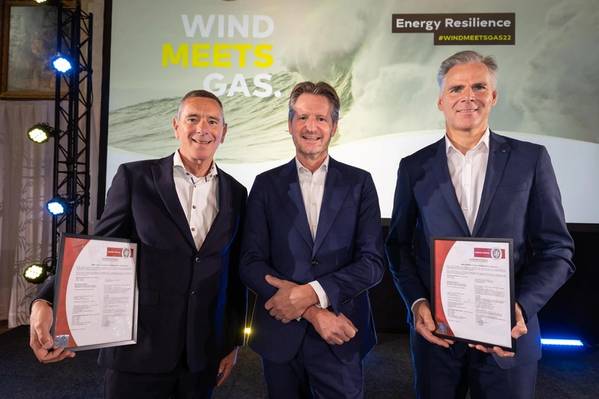
Noordgastransport (NGT) and NOGAT said Thurdsay they had become the first pipeline owners to receive the Certificate of Fitness for the transport of green hydrogen through their existing pipelines in the North Sea. The certificate was issued by Bureau Veritas Inspection & Certification, that conducted the survey.
Noordgastransport is a Dutch company operating nearly 500 kilometers of pipelines in the North Sea. NOGAT B.V. is the owner and operator of the pipeline system NOGAT. It transports gas produced on the Danish, German and Dutch part of the continental shelf to the Dutch market.
Ron Hagen, director NGT: "We are very pleased with this certification. This shows that our NGT pipeline is suitable for the transport of up to 100% pure green hydrogen. This means that our pipeline, which runs from the UK border to Uithuizen, is already ready for the future. Now we are still transporting natural gas, but soon we will be transporting green hydrogen. The capacity of these pipelines, approximately 12-14 gigawatts, will therefore allow us to move faster to large-scale green hydrogen production in the North Sea."
Hans Janssen, director at NOGAT, the pipeline that runs from Scandinavia, Danish and German waters to Den Helder: "This is good news for NOGAT and, more importantly, for the energy transition. By making use of existing infrastructure, we are able to make the transition to green hydrogen in the North Sea more swiftly. This can be pure hydrogen, but also a temporary mix of natural gas and green hydrogen. Both are molecules and we need both. 
Besides the fact that re-use is faster because it is already there, it is also cheaper. Moreover, there is no need to create landfall through vulnerable coastal areas or the Wadden Sea. The impact of re-use therefore has a much lower impact on the environment, nature and ecology than building a new pipeline."
"We are very excited about the contribution we can make in this project. As an independent party, Veritas has reviewed a previously conducted study, which was related to the suitability of pipelines as a means of transport of green hydrogen. This is completely in line with our role as a TIC - a Testing, Inspection & Certification service provider - and with our expertise in the field of hydrogen implementations," said Robert de Lange, Operations Director Industry & IVS Benelux of Bureau Veritas. "Our assessment and subsequent certification justify the confidence NGT and NOGAT as well as the government and other stakeholders, can have that these pipelines fully meet the 'fit for purpose' claim".
In 2018, DNV investigated the robustness of the pipelines' steel, which showed that the steel is suitable and safe for hydrogen transportation. The pipelines are regularly inspected internally and externally to ensure their integrity. A major inspection is conducted every five years. The pipelines are supervised by the State Supervision of Mines. The Certificate of Appropriateness is valid until 2062.